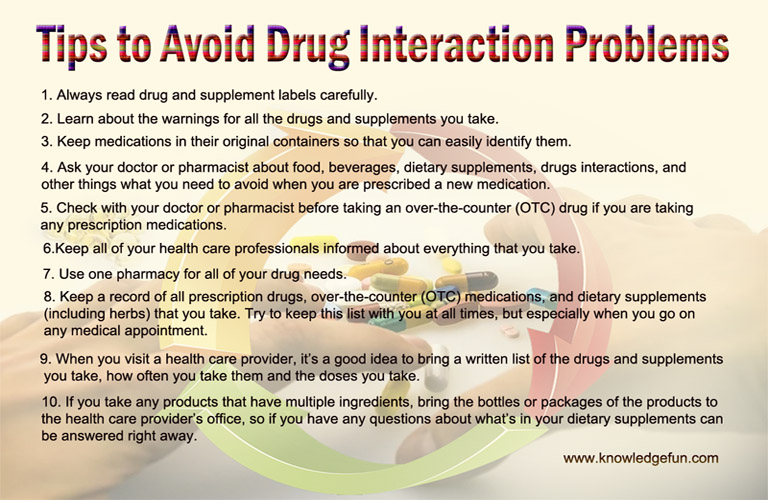Tips to Avoid Drug Interaction Problems
There are lots of things you can do to take prescription, over-the-counter (OTC) medications, and supplements in a safe and responsible manner. Also, often, when you visit a health care provider for the first time, you fill out a form that asks you to list all the drugs and supplements you take. Be sure to update this information every time you visit the provider’s office.
Tips to Avoid Problems:
- Always read drug and supplement labels carefully.
- Learn about the warnings for all the drugs and supplements you take.
- Keep medications in their original containers so that you can easily identify them.
- Ask your doctor or pharmacist about food, beverages, dietary supplements, drugs interactions, and other things what you need to avoid when you are prescribed a new medication.
- Check with your doctor or pharmacist before taking an over-the-counter (OTC) drug if you are taking any prescription medications.
- Keep all of your health care professionals informed about everything that you take.
- Use one pharmacy for all of your drug needs.
- Keep a record of all prescription drugs, over-the-counter (OTC) medications, and dietary supplements (including herbs) that you take. Try to keep this list with you at all times, but especially when you go on any medical appointment.
- When you visit a health care provider, it’s a good idea to bring a written list of the drugs and supplements you take, how often you take them and the doses you take.
- If you take any products that have multiple ingredients, bring the bottles or packages of the products to the health care provider’s office, so if you have any questions about what’s in your dietary supplements can be answered right away.
Browse Pages:

How to Find Information
For many drugs and supplements, there’s little information on possible interactions. To find more information about supplement-drug interactions and other aspects of the safety of dietary supplements, try these resources:
- Your health care providers and your pharmacist
- The National Center for Complementary and Integrative Health’s online resources on dietary supplements and herbs
- The Office of Dietary Supplements at the National Institutes of Health
- The U.S. Food and Drug Administration
- MedlinePlus, a resource provided by the National Library of Medicine
Some interactions between supplements and drugs are very dangerous.
Did You Know?
Some interactions between supplements and drugs are very dangerous. For example, interactions can decrease the effectiveness of critically important drugs—such as drugs that prevent transplanted organs from being rejected.
Some supplements can increase the effects—including unwanted side effects—of drugs. For example, herbs that decrease blood sugar may interact with anti-diabetes drugs to cause blood sugar to drop too far.
Sometimes, taking a drug and a supplement together may decrease the drug’s effects. This means that you aren’t getting the full benefit from the drug that your health care provider wants you to have. For example popular herbal supplement St. John’s wort is especially well known for decreasing the effects of drugs.
Some supplements may increase the effects and side effects of drugs. For example, the herb schisandra may slow down the processes in your body that change drugs into inactive substances. So if you take this herb while you’re also taking a drug, the amount of the drug in your body may increase. As a result, the drug’s effects may be too strong.





